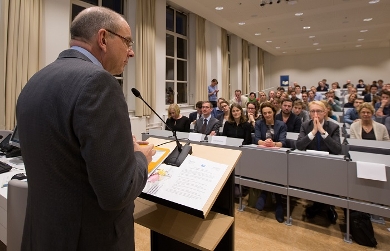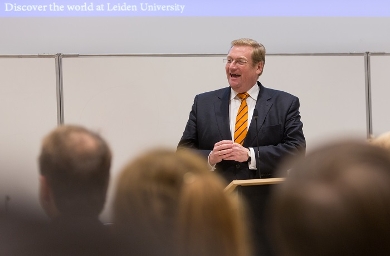
Lecture on international judicial cooperation by Ard van der Steur and Koen Geens
On Monday 21 November a lecture was given at Leiden Law School of Leiden University by Belgian Minister of Justice Koen Geens and Dutch Minister of Justice and Security Ard van der Steur in which they talked about international judicial cooperation. The lecture focussed on cooperation between the Netherlands and Belgium within the European Union. The ministers considered the areas of contention and possibilities for improvements in cooperation, and the question of to what extent any problem areas arise from differences in national legislation or values.

Vision of Minister Koen Geens
Minister Geens gave the first lecture following a short introduction by Jannemieke Ouwerkerk, Professor of European Criminal Law. He made two general comments and looked at four topics which he used to illustrate current areas of tension in international judicial cooperation. He emphasised that his background was not in criminal law but in finance, and that he is Belgian which influences his views on sovereignty. Generally speaking, sovereignty is considered less important by Belgians than by the Dutch. This immediately clarified the main difference between both countries when it comes to the vision on international judicial cooperation. But apart from this, both Ministers appeared to get along together very well, both in terms of their vision on issues within European criminal law and their sense of humour. They are both in favour of a stronger Europe instead of ‘more’ Europe. Necessity has given rise to a need for improvements and better cooperation.
Minister Geens took the European Investigation Order as the first topic to illustrate the tension existing in judicial cooperation. He finds it strange that although for a long time the principle of mutual recognition has been the prevailing starting point for cooperation in the EU, countries still have difficulty with the transfer of authority. Many countries still want to determine the safeguards themselves. The European Investigation Order will make it easier to order another Member State to carry out an investigation. The Minister believes that this is a development not limited to just the European Investigation Order.
A second area of tension he highlighted is the role of internet providers who believe that from the viewpoint of privacy they can decide what information they provide on the telephone behaviour of their clients. Often the telephone data of all users of a certain provider is stored in one place in a specific Member State. Because of this it is very difficult for judicial services to access communication data of their own citizens needed for criminal investigations. This can cause many problems in Europe for which the ministers are actively seeking solutions. Outside Europe, and in particular when data is stored in the United States, no solution for this problem has yet been found.
The third and perhaps most vivid topic that the minister touched on was terrorism. He acknowledged his awareness of what people sometimes thought about Belgium and its approach to terrorism. But he believes that the first country confronted with this issue is the one left holding the baby as it were, and that it is vitally important to separate global issues from national issues. Terrorism is a global problem. As a result of terrorism, the importance of sharing information has increased and the fact that information sharing has indeed increased can be seen as a positive development. Terrorism can only be tackled through cooperation. But it is important that the provision of information is not a one-way process. There seems to be a current trend that the bigger the country, the less information it provides to other countries or European institutions like Europol and Eurojust.
The Minister concluded by commenting on sovereignty. It is of vital importance when tackling crime that countries distance themselves partially from their sovereignty and coordinate their activities. There is a discrepancy with public opinion in this area: giving up sovereignty is viewed by the general public as problematic. Minister Geens believes that we must realise that the Court of Justice of the European Union is responsible for the protection of human rights and will not tolerate violations in this regard.

Vision of Minister Ard van der Steur
Ard van der Steur introduced his vision of judicial cooperation by focussing more on historical developments. He started with an anecdote concerning a march from the Pieterskerk in Leiden in 1830, in which a group of Dutchmen were unsuccessful in calling to order Belgian agitators who wanted to secede from the Netherlands. The Minister light-heartedly called for a new initiative for such a march. At the end of his lecture he philosophised about establishing a joint Code of Criminal Procedure for the Netherlands and Belgium. This is clearly not such an odd idea when you consider how both codes of law were established.
In 1815 Belgium and the Netherlands both started developing a similar system of law. This was developed separately so that certain differences arose. As a result of the cooperation necessary to deal with crime, something not limited by boundaries, the systems grew increasingly towards each other throughout time. It could even be asked what the added value of a state is, when law breakers such as terrorists have no regard for borders.
The approach to cybercrime is linked to the required cooperation mentioned above. The Minister believes that we will get nowhere in dealing with cybercrime if we stick to waiting for requests for assistance and distinguishing between jurisdictions. The notion of investigation without borders is become increasingly significant. He believes that it is important that information is not only shared that is expected to be necessary for a state, but that all information is shared so that the other state can decide itself whether it is important or not. This manner of sharing information also gives rise to problems - who guarantees the privacy of citizens? who can you turn to with objections? and who monitors information before it is shared with other Member States?
The Minister is aware that this is taking things very far, but by using a striking example he illustrated that change is most definitely required. He describes a situation in which a Dutchman, a German and a Belgian are together in one room. They each have a computer on which they are logged into their own judicial information system. They request information from each other’s systems by sending messages via their computer. A request for information has to be sent by the Dutchman to the Belgian and German separately. Because this is laid down in legislation they are unable to consult with each other which would be a far more efficient manner to get the same information. These kinds of situations illustrate the need for closer cooperation. However, more intensive cooperation with regard to sharing information also leads to more concerns about sovereignty.
All things considered, it appeared from the lecture that the ministers agreed on a great deal of topics. The biggest difference being that sovereignty is considered more important in the Netherlands than in Belgium. Both ministers envisage positive developments in the future where there will be more necessity, and more opportunities, for the improvement and intensification of cooperation.
